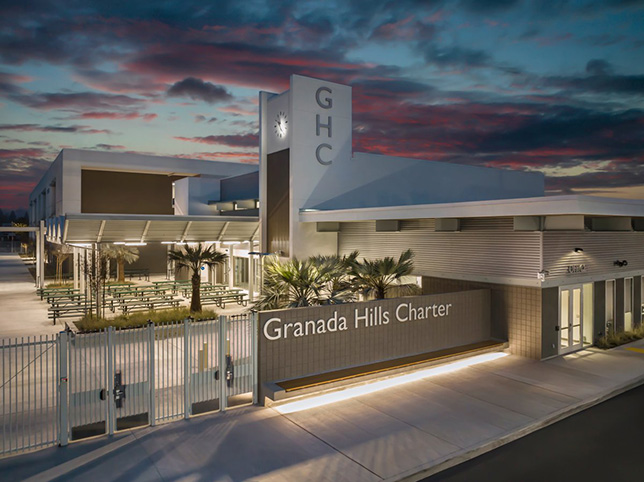California Charter School Completes $41M Expansion Project
One of the largest public charter schools in the U.S., Granada Hills Charter near Los Angeles, recently announced the completion of a $41-million campus expansion project. The school partnered with builder C.W. Driver Companies to create a new, 90,000-square-foot campus about a mile from the existing high school. The extra space will allow the school to expand its curriculum to students between transitional kindergarten and eighth grade and boost its enrollment from 4,700 to 6,000 by 2023, according to a news release.
The new campus was built on a former school site, and the work entailed demolishing nine buildings, constructing three new ones and installing temporary portable classroom buildings. The first of the new constructions houses common areas like administration offices, a multipurpose room to use as a cafeteria or auditorium, and a media space. The second new building stands three stories and houses 48 classrooms for elementary- and middle-school students. The third new facility houses a full-service kitchen and student locker rooms. Another existing building was renovated to include restrooms, while new outdoor spaces include a lit sports field with a running track and two basketball courts.

Photo credit: RMA Architectural Photography
“By leveraging decades of academic construction experience, C.W. Driver Companies has successfully built a high-quality educational environment tailored to Granada Hills Charter’s diverse academic, athletic and extracurricular offerings,” said John Kately, project executive at C.W. Driver Companies. “Years in the making, the modern campus enables Granada Hills Charter to provide families and children with continuity in education for all grades up until high-school graduation.”
According to a news release, Granada Hills Charter was founded in 1960 and converted into an independent charter school in 2003. The site of the expansion was purchased in 2014 with the explicit purpose of creating a campus for elementary- and middle-school students. Enrollment for the younger grades began in fall 2019.
“With the expertise of C.W. Driver Companies, we are now able to broaden our comprehensive academic, arts, athletics and social programming to reach over 27 percent more students in grades TK-8 by 2023,” said Brian Bauer, executive director at Granada Hills Charter. “This 21st-century facility provides an enhanced student-centric experience that will prepare our students for a future they envision and own.”
Granada Hills Charter and C.W. Driver Companies also partnered with PBK-WLC Architects, Inc.
About the Author
Matt Jones is senior editor of Spaces4Learning. He can be reached at [email protected].